“The place to improve the world is first in one’s own heart and head and hands, and then work outward from there.” - Robert M Prisig (Zen and the Art of Motorcycle Maintenance)
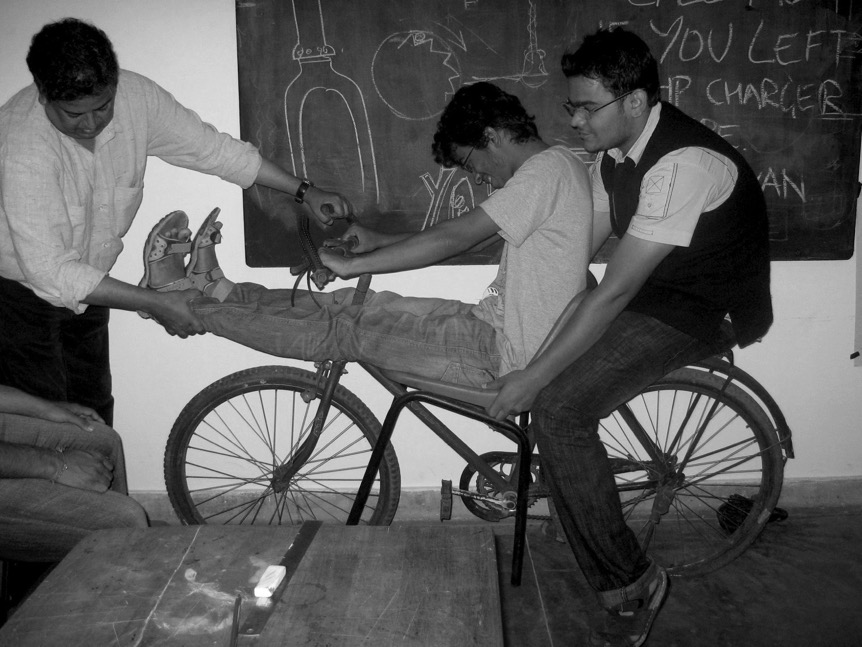
Honouring Sudipto Dasgupta who set up this lab and has done much of the work 28.01.1963 – 22.09.2019
Announcement
Frugal Design Lab is happy to become part of the DESIS (Design for Social Innovation and Sustainability) network https://www.desisnetwork.org/ and will now be known as Frugal Design DESIS Lab
DESIS is a no-profit and cultural association, with the purpose to promote design for social innovation in higher education institutions with design discipline so as to generate useful design knowledge and to create meaningful social changes in collaboration with other stakeholders.
Lead: Naga Nandini
Mandate:
Frugality has been part of everyday life in India for centuries. Although in recent times, it is a less appreciated value, there are still practices alive that we can study and learn from. In this time of global concern about climate change, it is a value we need to revisit, understand and inculcate into design practice specifically.
So how can we understand frugal? Through our work, we realized that there is not one definition for the value. It is not only about frugal innovation, practiced by people who have limited resources. It need not be something we are forced to adopt in times of crisis or poverty. It is not only about the nostalgia of going back to simpler times, but going forward using newer technologies to achieve something that is pared down and simple, removing non-essentials. It is both a mental and physical paring down, questioning needs and understanding the impact of what of how and what we design.
Frugality really encompasses the personal, local and the global. It has physical, aesthetic and technological dimensions.
How could we explore, understand and map this landscape and position our practice within it?
You can visit https://frugaldesignlab.wordpress.com/ to read more about our work and archives.
Vision
The Frugal Design Lab has evolved over the last 10 years exploring several ideas –grass roots innovations, craft communities, small-scale industry, old and new technologies and new ways of making. Through projects and workshops, we interact with a variety of people and organizations and we seek to question and refine the way we design things today.
We envision new processes in design that use frugality as the core principle, not only for people who are constrained to adopt it, but as a universal value, to develop frugality as an aesthetic, to design sustainable and inclusive products and systems.
Research Areas & Inquiry
Redesign
To develop innovations proposed in past projects and refine them to benefit the original stakeholders
Frugal and the design process:
To understand and develop the use of frugality as a design principle towards sustainable products, practices and systems
Learning from Practice in India:
- To map and understand frugal practices in the Indian context
- To map and learn from scale-scale urban semi-industrial making, which has been excluded from the creative manufacture sector
- To experiment and work with materials
Landscapes of Frugality:
- To map the landscape of frugality through different lenses – historical/cultural, craft, small-scale industry, emerging technology and personal ways of living
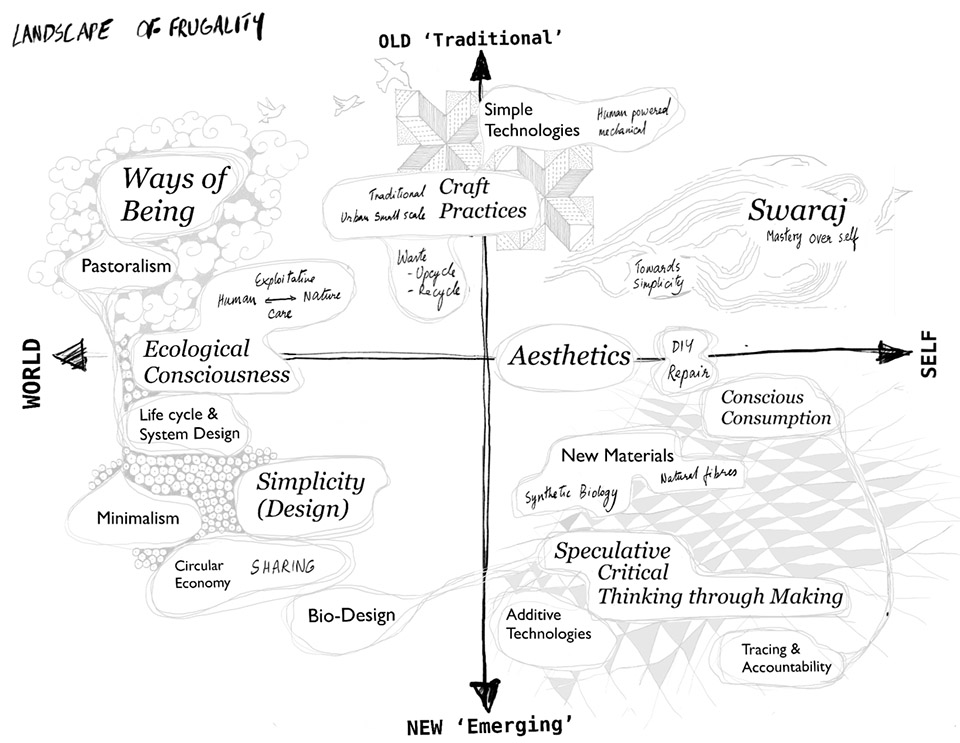
Mapping the landscape of frugality
Mapping this landscape within 4 axes may help us understand it better.
- The self is about individual practice, which could be daily actions like riding a bicycle or philosophical practices like Swaraj and conscious consumption.
- The world is about social and cultural practices like frugal innovation and ways of living like pastoralism, minimalism and man/nature relationships
- Traditional technologies is about understanding craft and small scale industrial practices and human powered machines and learning from these
- Emerging technologies are about understanding and using new tech like synthetic biology and additive technologies that will help us to design with more care for resources
The intersections of these axes provide rich spaces for exploration and intervention.
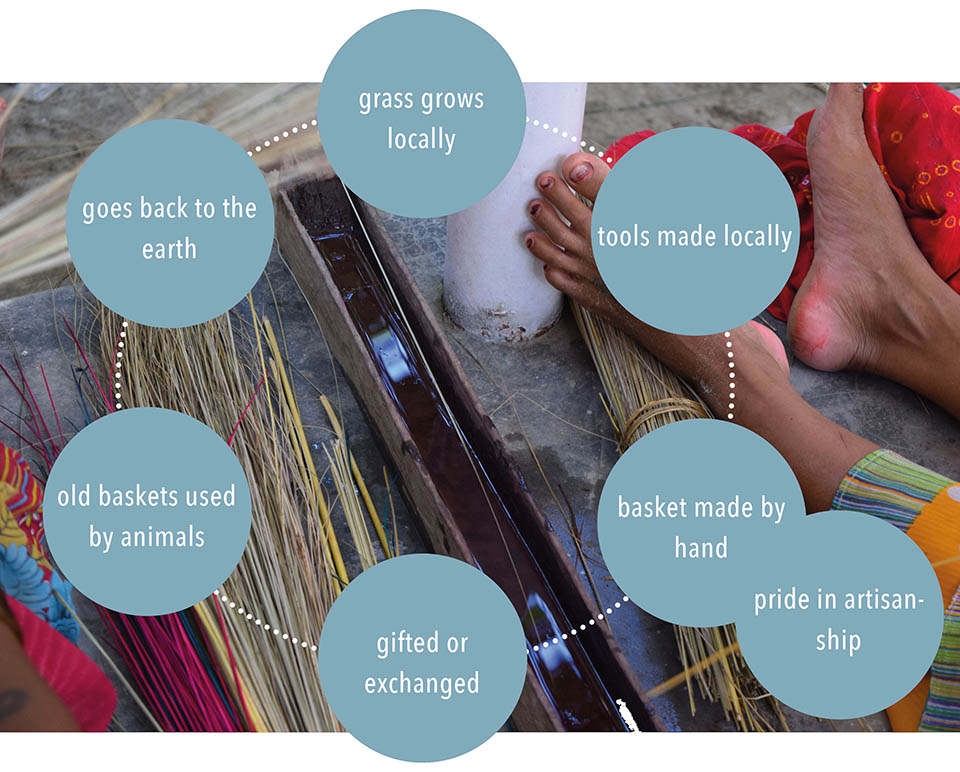
Learning from the inherent frugality of craft practices
Focus Areas
Below are a few projects we have worked on. You can see more details in our archive, or contact us. You can visit https://frugaldesignlab.wordpress.com/ to read more about our work and archives.
After the Storm
2019 Design for flood hit Assam with Selco Foundation
Project Lead: Sudipto Dasgupta
This project is set in the backdrop of North Lakhimpur district of Assam – designs and prototypes a range of flood resilient solutions using frugal and vernacular resources, existing technology and co-creative methods. The major focal point is the ability to survive the flood and how a product, service or system around it will be able to function when the more conventional resources are cut off.
Some of the ideas developed in this project are:
- Floating Toilet - is a balanced structure that is able to float and navigate through stagnant water.
- Thermoelectric Chulah - This new and redesigned chullah has the facility to generate enough energy to power two USB ports which in turn helps charge mobile phones and provides a light source
- Secure Food Shelving - a DIY product made with bamboo and coconut rope with four different compartment to store food grains, pulses, vegetables, utensils and extra grain sacks to store food safely and conveniently with protection from water, insects and moisture.
- Hover Skirt – to convert any flat platform into a hovercraft/board. This hover skirt is modular enough to wrap onto a range of sizes that make it easy to install and use.
- Trickle – a portable water filter which is handy, easy to use, cheap and comes with cartridges which could be replaced with naturally available materials
- Co-space – creating the systemic working of a co-operative model along with designing a flood resilient co-working space to provide alternative occupational opportunities
- Alternate Energy Generator - captures physical movements in the house to harness it in the form of usable energy
- Alternative Rain Water System - traditional Rainwater Harvesting and storage system re-designed to fit into this particular context, using the minimal and frugal lifestyle of the people from the area and the uniqueness of the stilt houses as constraints for the design
- Floating House - a structural integration of vernacular materials and design, coupled with modern architecture
- Bonnyar Ghot – Cooking Vessel that helps in reducing the resources expended in the process of cooking a meal and economizes water use for this flood prone region
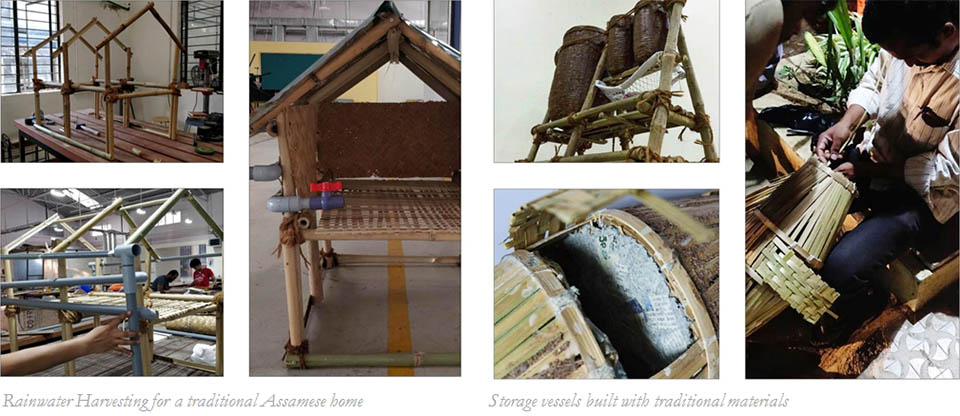
Project: Familiar Process – Unfamiliar Terrain
Project Lead: Sudipto Dasgupta
This project studies the extreme vulnerability of communities of small fishermen of coastal India. The fisherman communities of Malpe are the major stakeholders identified by a Bangalore based NGO – Selco Foundation.
While this was where the initial line of enquiry hovered around, as the group got ‘familiar’ with the terrain, a new set of definitions of vulnerability emerged. One of them was that vulnerability and poverty, even though were related issues could exist without the other. Here vulnerability did exist without abject poverty. This was a typical example where over supply of human resource generating extreme disregard towards safety and wellbeing.
Some products developed were:
- Single wheel trolley for fish
- Stove for Fishing Boat
- Toilet for Fishing Boat
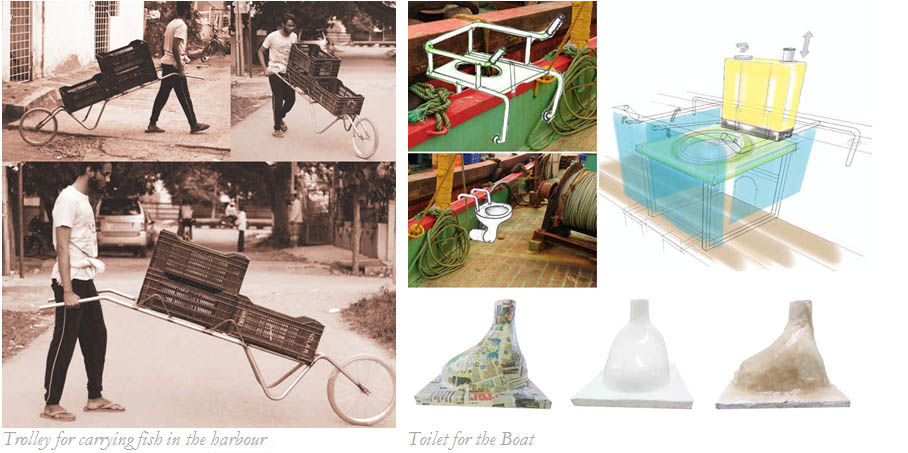
Project: Inventing Green
Project Leads: Sudipto Dasgupta, Ravi Mani
Are the products and services that claim to be green really green?
‘Inventing Green’ was a project run in collaboration with SELCO that questions the current and local green manufacturing process. The aim was to develop ways to reduce embodied energy in Decentralized Renewable Energy (DRE) lighting solutions for underserved communities by experimenting with local materials and skills. Mainly working with solar energy, these solar powered lighting solutions could improve livelihood, education or well being of the community.
SELCO Foundation works to link the benefits of sustainable energy to poverty eradication by collaborating with NGOs, local financial institutions, education institutions and social enterprises. We worked with them to imagine new ways to think and work with materials and manufacturing processes to rethink the products in terms of form, materials, packaging and manufacturing. A key idea was to use local and traditional artisans and natural material to replace harmful plastics in these products.
Product development for Solar Lighting:
- Lamps using traditional wood turning from Channapatna
- Lighting for Public Spaces using sustainable material
- Hanging lamps using Channapatna Lacquer wood work
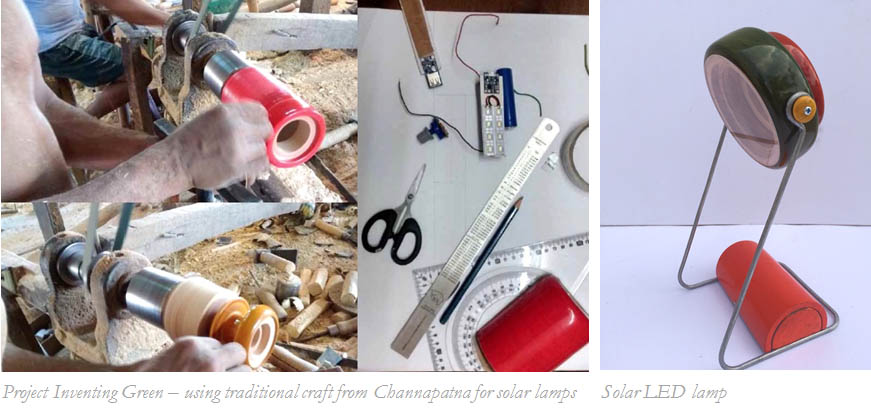
International Workshops
2016: International Design Summer School IDSS 2016 workshop on Frugal design at Zurich University of the Arts
2016: Behind Fences, a workshop in applied design research workshop run in Hamburg’s Gegenwartsakademie, or Contemporary Academy for Social Sustainability, Designxport and Goethe Institute, Bangalore
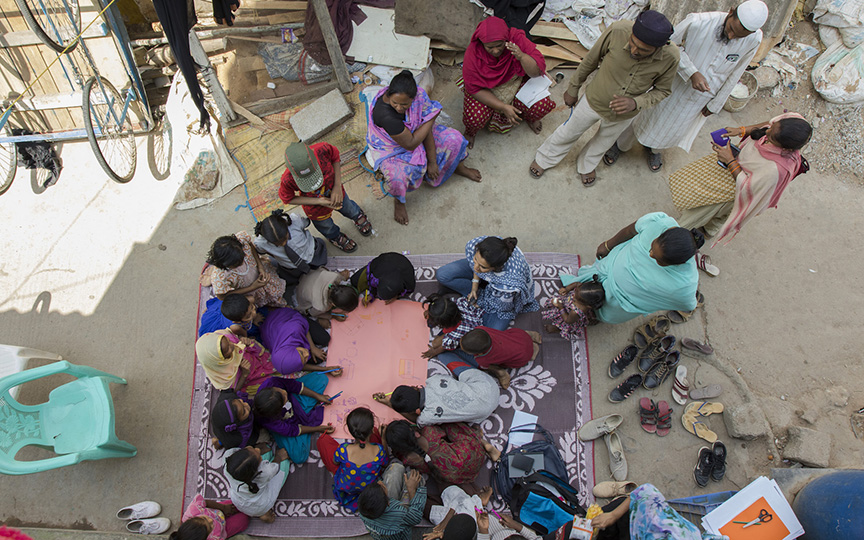
Frugal Design workshop – Interactions with community
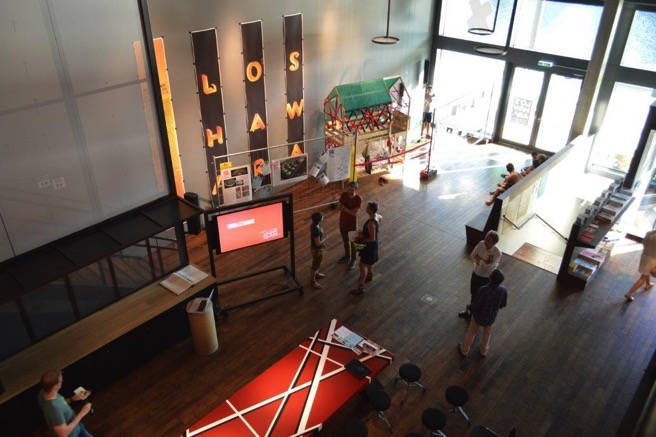
2016: Behind Fences - Exhibition of work
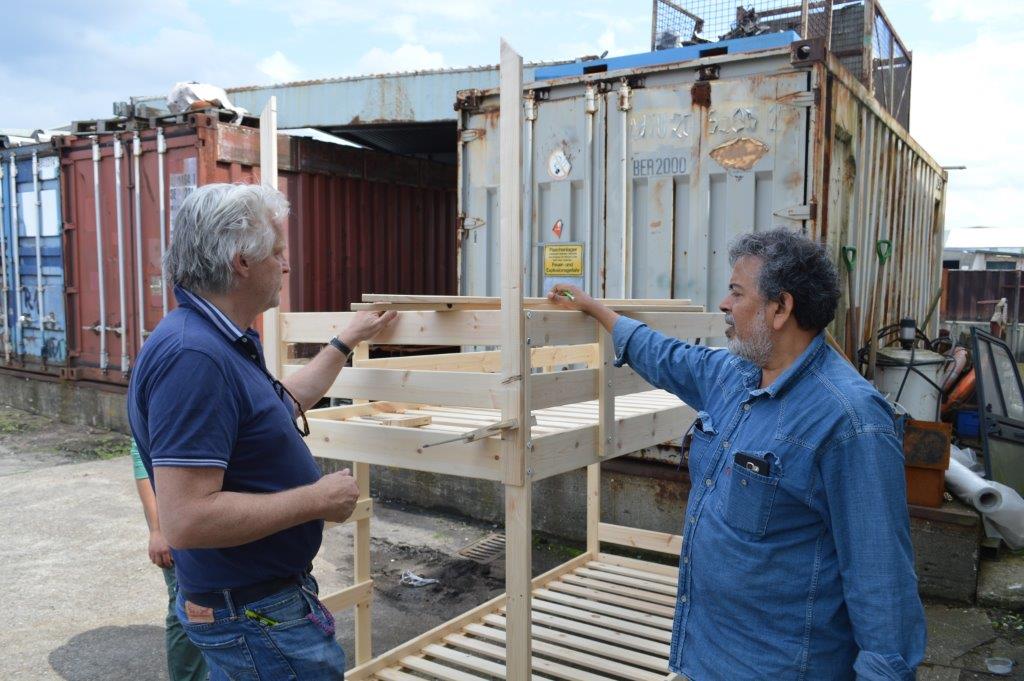
2016: Behind Fences - Prototyping
Enquiries
For more information about this program, kindly email naganandini.d@manipal.edu
You can visit https://frugaldesignlab.wordpress.com/ to read more about our work and archives.
